Who will be king of football in Africa?
Who will be king of football in Africa? sadminSport
It’s all systems go for the 2013 edition of the Orange African Cup of Nations tournament. From 19 January to 10 February 2013, the world’s eyes will once again be on South Africa as 16 of Africa’s best football nations battle it out for the prestigious continental crown.
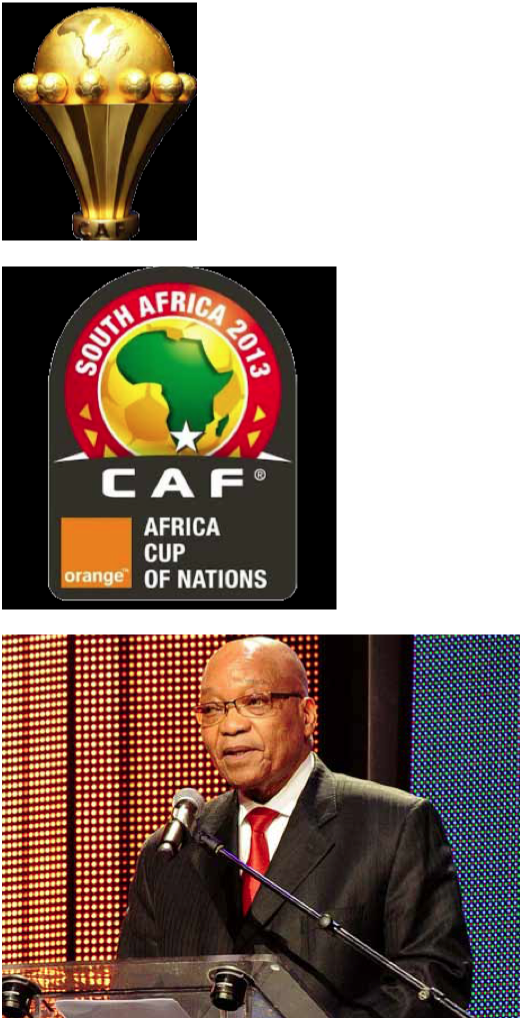 South Africa won the rights to host the tournament in 2017, while Libya was scheduled to host it in 2013. However, when the civil war in Libya forced them to withdraw, South Africa agreed to host the 2013 event. Matches will be played at five venues countrywide.
South Africa won the rights to host the tournament in 2017, while Libya was scheduled to host it in 2013. However, when the civil war in Libya forced them to withdraw, South Africa agreed to host the 2013 event. Matches will be played at five venues countrywide.
FNB Stadium will host the opening match and the fi Other matches will take place at the Mbombela Stadium (Nelspruit), Nelson Mandela Bay Stadium (Port Elizabeth), Royal Bafokeng Stadium (Rustenburg) and Moses Mabhida Stadium (Durban).
Proud track record
Speaking at the final draw of the competition in Durban, President Jacob Zuma said South Africa had a proud track record of hosting sporting events. “We are counting down the last days before South Africa hosts the 29th edition of Africa’s biggest soccer festival, for the second time. We are eagerly looking forward to host this happy festival of African football next year.”
He said government fully supported the South African Football Association and the Local Organising Committee. “We have made the necessary guarantees to the Confederation of African Football (CAF) to stage what we plan to be another successful sporting event after the 2010 FIFA Soccer World Cup.”
Government is spending R461.1 million to host the tournament of which R323 million will go to national departments to cover costs associated with hosting the tournament, including security, protocol and migration services.
A further R15 million for health-related costs associated with hosting the tournament will be allocated to provinces, while R123.1 million will go to the host cities to cover their costs.
Preview of groups
Group A
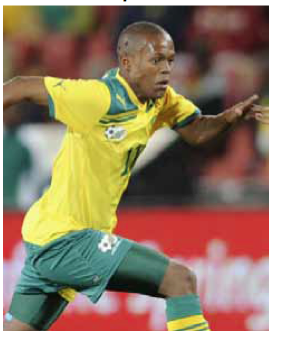 South Africa: Hosting the tournament for the second time since readmission to the international football scene, South Africa will be among the favourites to lift the trophy in front of the home crowd. Boasting the talents of former Tottenham Hot-spur centre back and captain Bongani Khumalo, new sensation Dean Furman from English League One club Oldham Athletic and Ajax Amsterdam’s Thulani Serero, the host nation will be a tough opposition to beat.
South Africa: Hosting the tournament for the second time since readmission to the international football scene, South Africa will be among the favourites to lift the trophy in front of the home crowd. Boasting the talents of former Tottenham Hot-spur centre back and captain Bongani Khumalo, new sensation Dean Furman from English League One club Oldham Athletic and Ajax Amsterdam’s Thulani Serero, the host nation will be a tough opposition to beat.
Cape Verde: Making an appearance for the first time in the tournament, Cape Verde surprised many by knocking out former champions and powerhouse Cameroon. Playing in the opening match against the host nation, the minnows will likely find the stage too big for them against the much more experienced sides in the group.
Morocco: Winners of the competition in 1976 and ranked one place above South Africa on both the continental and world rankings, the Atlas Lions, as they are affectionately known, have failed to replicate the form that won them the tournament 36 years ago.
They have been involved in 13 editions of the competition, finishing in third place in 1908 and runners up in 2004, losing to host nation Tunisia. Boasting the likes of Arsenal striker Marouane Chamakh, they are likely to give their opponents a run for their money.
Angola: Ranked one place below the host nation South Africa, the southern African side will prove a tough side to beat having contested the past two editions. Since making their international debut against Cuba in 1997, Palancas Negras’s highlight was qualifying for the 2006 FIFA World Cup in Germany.
Group B:
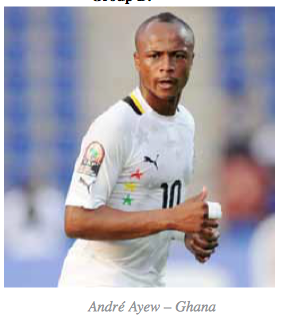 Ghana: Ranked number four on the continent, the Black Stars head into the 2013 edition of the African Cup of Nations as one of the favourites to lift the trophy.
Ghana: Ranked number four on the continent, the Black Stars head into the 2013 edition of the African Cup of Nations as one of the favourites to lift the trophy.
The Black Stars rose to African football prominence by becoming only the third African team in history to reach the World Cup quarter-finals during the 2010 tournament in South Africa. They boast the likes of Asamoah Gyan, Andre Ayew and Real Madrid’s Michael Essien.
DR Congo: The Leopards' first international success at the tournament came in the 1968 African Cup of Nations in Ethiopia, where they beat Ghana 1–0 in the finals.
Ranked number 30 in Africa, they may struggle to beat their more fancied opponents, Ghana and Mali.
Mali: The top ranked side in the group, the Eagles made football headlines after coming back from a 4–0 deficit with 15 minutes left to level 4–4 with Angola in 2010. It is considered to be one of the best comebacks in recent memory. With stars like Seydou Keita, who plies his trade in the Chinese Super League and is a former Barcelona versatile middle fielder, they may come up second to group favourites Ghana.
Niger: The bottom ranked side in the group, Niger is likely to be the whipping boys of the group. Having failed to qualify from 2006 to 2010, they only made their appearance in the 2012 edition in Angola losing all their group matches.
Group C:
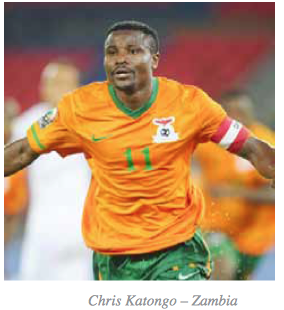 Zambia: The defending champions come into the tournament ranked number six on the continent. Having qualified through penalties against Uganda, they will be under pressure to prove that their win over the Ivory Coast in the 2012 edition was no fluke. Boasting the likes of captain Chris Katongo, Rainford Kalaba and Collins Mbesuma, they will be a tough op- ponent.
Zambia: The defending champions come into the tournament ranked number six on the continent. Having qualified through penalties against Uganda, they will be under pressure to prove that their win over the Ivory Coast in the 2012 edition was no fluke. Boasting the likes of captain Chris Katongo, Rainford Kalaba and Collins Mbesuma, they will be a tough op- ponent.
Ethiopia: Ranked number 33 on the continent, Ethiopia is renowned more for its athletic talent than for football. They will appear in this tournament as the lowest ranked team and may struggle to dominate the football pitch like they do on the athletics track.
Nigeria: The perennial underachievers of African football, Nigeria comes into the tournament ranked number 13 continentally and 63rd inter- nationally. They have only won the tournament in 1994 and had to withdraw in 1996 following violent clashes in the country. As always, they come into the tournament as favourites, but the jury is still out on whether they will rise to the occasion. Key players include John Obi Mikel (Chelsea), Peter Osaze Odemwingie (West Brom Albion) and Shola Ameobi (Newcastle United).
Burkina Faso: Ranked 23rd in Africa, the Stallions failed to qualify for the tournament in 2006 and 2008, and were knocked out in the fi round in the last two tournaments. Together with Ethiopia, they are likely to struggle against the two powerhouses of African football.
Group D:
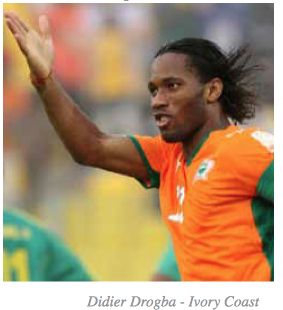 Ivory Coast: Coming into the tournament as Africa’s top-ranked team and 16th in the world rankings, the Elephants, as they are known, will start the tournament as clear favourites. Losing to Zambia on penalties in Equatorial Guinea and Gabon, they will come out all guns blazing with global icons like Yaya and Kolo Toure, both of Manchester City and captain Didier Drogba of Shanghai Shenhua.
Ivory Coast: Coming into the tournament as Africa’s top-ranked team and 16th in the world rankings, the Elephants, as they are known, will start the tournament as clear favourites. Losing to Zambia on penalties in Equatorial Guinea and Gabon, they will come out all guns blazing with global icons like Yaya and Kolo Toure, both of Manchester City and captain Didier Drogba of Shanghai Shenhua.
Algeria: Algeria will be one of the favourites to lift the cup in February and comes into the tournament ranked number two on the continent. They have won the tournament only once in 1990 and were runners up in 1980.
Tunisia: The Eagles of Carthage, as they are known in football circles, won the tournament in 2004 when Tunisia was the host country. They were the losing finalists in 1996 when then hosts South Africa beat them by two goals to nil. They are currently ranked seventh in Africa and 45th in the world.
With their experience in the continental show- piece, they are likely to emerge as the second best team after group favourites Ivory Coast.
Togo: Togo made headlines in the 2010 tournament when they withdrew from the competition after their bus was attacked by rebels in Angola. They have only qualified once in the last five tournaments. Leading their attack will be the influential and most recognisable face in Togo- lese football, Emmanuel Adebayo, who plays for Tottenham Hotspur in England.